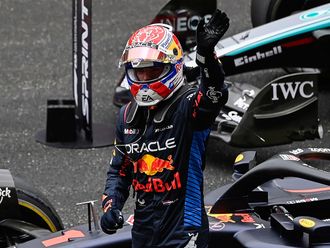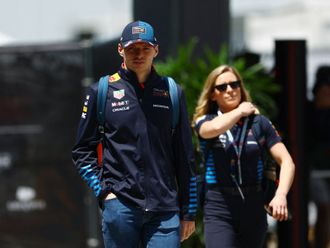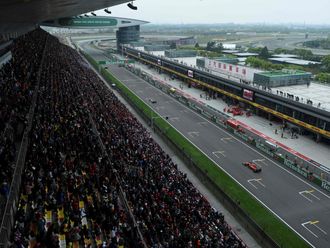
You only have to look around to see that Communism doesn’t work. It’s only thanks to consumer capitalism that we’re living longer and are able to enjoy things like X Factor and Gordon Ramsey. The right to buy a house, to holiday in Mustique, and to spend exorbitant sums on money on dentistry is our right as fortunate capitalists.
However, despite being a believer in the right to the acquisition of wealth, I must confess that I am losing my patience with the BBC and their repeated cutting of their sports broadcast budget.
It was only in 1979 that the first full Formula 1 season was broadcast in the United Kingdom. The BBC had bought the rights and, with Murray Walker pretty much doing most of it by himself (James Hunt wasn’t quite as committed) they brought Formula 1 into our living rooms.
The BBC lost the rights to ITV before the 1997 season and, not being a public-funded broadcaster, kept interrupting races with adverts for tyres and hand cream. The BBC won the rights back for 2009 until they had to cut their deal short and enter a dual contract with BSkyB in 2012.
BSkyB, the UK biggest pay-view network, purchased the rights to broadcast F1 from 2012, while the BBC would only show 10 of the 19/20 live races each year, with the other half coming in the form of a highlights show. Sky set up its own dedicated F1 channel, charging us £40 per month for the privilege, should we want to sign up. Most of us didn’t.
This week the BBC released details about their plans for the immediate future, and say that they need to cut £35 million from the sports budget. This is heart-breaking news since, I’ve always thought, the BBC are excellent sports broadcasters.
It is believed that the BBC already pays up to £14 million annually for the current deal it has – 10 live races and the remaining nine or 10 shown in highlights format. The split package in this form is rumoured to save the BBC about £10 million a year.
Why is it struggling? Well it would be popular to pour scorn over the corporation for being money-grabbing monsters, but that’s not the case. TV rights are becoming more expensive because the people – or companies – who are promoting them are greedy. Why does an F1 season need to cost a broadcaster £14 million a year? Where did that figure come from? Why not £20 a race?
Sadly, there’s more to it.
The BBC relies on license payers for funding. In essence if you watch TV in the UK, you need a TV license. This was easy to manage for a long time, but since the dawn of the digital age people are able watch TV without paying for it and the networks will never find out.
The BBC has even been thwarted by its own online iPlayer, which doesn’t require you to have a license. Then there are the other corners of the internet. I could list several websites that stream live TV for free. You simply plug your laptop into the TV via HDMI lead, close the several hundred pop-ups and hey presto: you can watch Lewis Hamilton and Nico Rosberg not talk to each other.
All this means that the BBC is losing revenue. Sky, even, is losing revenue since their beloved channels can also be streamed through uncouth means.
So who’s at fault here?
Is it the fans for not playing ball and paying the license fee, or are they being forced to find other ways to watch races live because they can’t afford the license fee? Is it the BBC for not asking the not-so-flush British government for more financial help from the already hard-up tax-payers who are already paying the licence fee? Or is it that the BBC simply can’t afford to pay the kind of prices being asked for?
It’s the latter.
I don’t profess to know how broadcasting rights contracts are written, or who comes up with the figures, but I do that in F1’s case, CVC Capital Partners, who own F1, don’t give two hoots about the sport or its fans.
Their job is to make as much money as possible, at any cost. They invest nothing in the sport, they just sit back and take, take, take.
It is a mystery how the influential powers-that-be in Formula 1 haven’t put two-and-two together. Putting a sport on pay-TV may result in more income, but it also causes viewing figures to nose-dive and drives fans away. Of course, the ardent capitalist with no real love for the sport may not be too bothered, but will he change his tune when he realises that sponsors are less likely to come on board when they know TV-viewing figures are plummeting?
Sponsorship is how F1 makes most of its money – most teams rely on it solely. Is the board of a multinational corporation going to prefer to get their brand name on pay-TV or free-to-air TV? What will give them the most exposure and thus financial return? Exposure is the only reason to sponsor in the first place, so it’s a bit of a no-brainer.
It is obvious that the teams are struggling to attract big sponsors at the moment. Sauber haven’t had a main title sponsor for a while and McLaren – McLaren of all teams – haven’t been able to nail down a title sponsor since they lost Vodafone at the end of 2013. This has to be far more serious than those involved are letting on.
The stakes are high in F1, but as a fan I don’t care. If the BBC can’t afford the whole package then it may as well just can the whole lot. I just want to watch Formula 1 on the TV without being charged a small fortune.
I just want to enjoy it.












